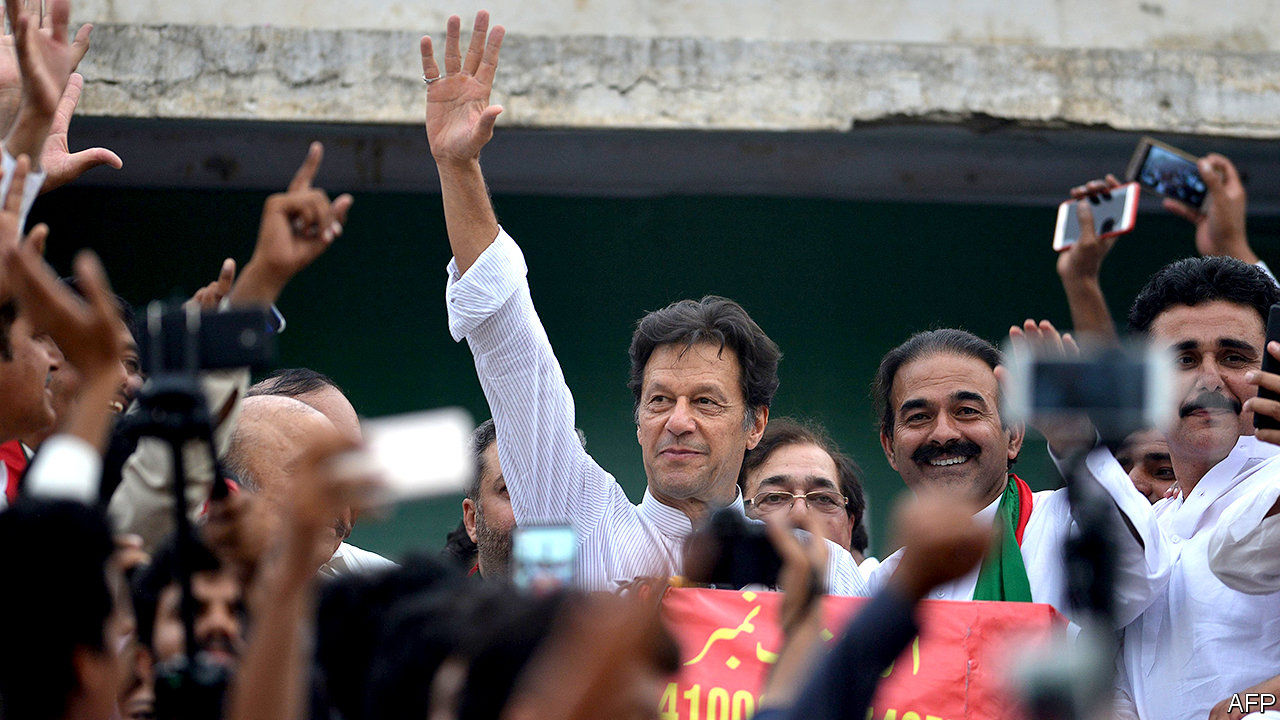 ON JULY 25th Pakistan will hold a general election that ought to be a historic marker for democracy. Around 106m registered voters have the chance to participate in only the second transfer of power between civilian governments in the nation’s coup-studded 71-year history. Yet it will probably be remembered for other reasons. Until just over a year ago, it seemed certain that the incumbent, pro-business Pakistan Muslim League-Nawaz (PML-N) would win a second term, boosted by their success in tackling nightmarish power-cuts. Today the polls are neck-and-neck, however. The Pakistan Tehreek-e-Insaf (PTI), led by Imran Khan (pictured), a former cricketer, has surged as its rivals, civil-rights groups, and media organisations claim the country’s powerful army is tilting the field in its favour. Why are the generals interfering?
ON JULY 25th Pakistan will hold a general election that ought to be a historic marker for democracy. Around 106m registered voters have the chance to participate in only the second transfer of power between civilian governments in the nation’s coup-studded 71-year history. Yet it will probably be remembered for other reasons. Until just over a year ago, it seemed certain that the incumbent, pro-business Pakistan Muslim League-Nawaz (PML-N) would win a second term, boosted by their success in tackling nightmarish power-cuts. Today the polls are neck-and-neck, however. The Pakistan Tehreek-e-Insaf (PTI), led by Imran Khan (pictured), a former cricketer, has surged as its rivals, civil-rights groups, and media organisations claim the country’s powerful army is tilting the field in its favour. Why are the generals interfering?
The army does not limit its role as protector of Pakistan to the battlefield. With 654,000 personnel and a reputation for competence that is not shared by any other institution, it has long seen itself as the de facto ruler of the country. Top brass decry the corruption of political leaders; they launch a coup every decade or so. But the damage it does to the army’s reputation and Pakistan’s international relations make that option less attractive today. Yet the army plainly finds the prospect of a second term for the PML-N unacceptable. The party’s leader, Nawaz Sharif, crossed red lines during his most recent term, seeking peace with India and attempting to claw back power for the civilian government. He stepped down last year after a court disqualified him from holding office.
The campaign to hobble the PML-N has three main prongs. First, the judiciary, often the army’s junior partner, seems preoccupied with the party. On July 6th an anti-corruption court jailed Mr Sharif for a ten-year sentence on a conviction that few lawyers believe meets the required standards of evidence. PML-N candidates up against army-favoured politicians have found themselves jailed too. Second, media organisations sympathetic to the party face quiet countermeasures. Geo, the largest TV station in the country, only returned to air from a mysterious country-wide blackout after promising the so-called “establishment” it would toe their line. Third, many PML-N candidates in the crucial province of Punjab say the military-intelligence service has pressured them to switch their allegiance to the PTI. At least 30 members have left the party. Meanwhile, election monitors are concerned about the poll itself: the army will deploy 371,000 troops on the day (four times as many as in 2013, despite greatly improved security). Its officers have also taken on much more responsibility inside the polling stations.
All this seems likely to deliver what is thought to be the army’s desired outcome: a hung parliament and a pusillanimous coalition government. If the PTI wins more than 100 of the 272 directly elected seats in the national assembly, it could form a government with the support of independents and smaller religious parties. Below that number it may have to seek a pact with the Pakistan Peoples Party, something Mr Khan has repeatedly ruled out on the basis of the alleged corruption of its chairman, Asif Ali Zardari, a former president (Mr Zardari denies wrongdoing). In any case, the new prime minister’s room for manoeuvre will be limited by a looming economic crisis. With the atmosphere surrounding the vote poisoned, political instability also awaits. The true winner of the 2018 election may well be a “party” that is not on the ballot paper. That is a loss for Pakistan.
No comments:
Post a Comment